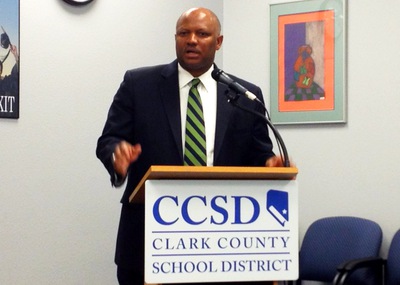Wednesday, May 9, 2012 | 2 a.m.
Sun coverage
An education reform package passed by the Legislature last year was supposed to have ended the practice of basing teacher layoffs on seniority rather than performance.
But that’s exactly how the Clark County School District says it will make the overwhelming number of layoffs under an arbitrator’s decision handed down last week.
Of the up to 1,000 layoffs the Clark County School District expects to make, just 38 will be targeted toward teachers with disciplinary problems.
The rest will be based on seniority because of the arbitrator’s ruling in favor of the Clark County Education Association, according to a district spokeswoman.
Education reformers, including Gov. Brian Sandoval, touted the bills passed in 2011 as a victory in efforts to help school districts weed poor-performing teachers from their ranks.
But as the bills are implemented, the difficulty of changing the education system is becoming apparent — particularly when many of the rules are subjected to collective bargaining agreements between employee associations and school districts.
Assembly Bill 229 last session said layoffs “must not be based solely on the seniority of the teacher or administrator.” But it left details up to the collective bargaining agreements negotiated between school districts and the county teacher associations.
An arbitrator last week ruled in favor of the Clark County Education Association, granting pay raises for years of service and education. The Clark County School District, which had requested salary freezes, said that decision will force layoffs.
The arbitrator’s decision in favor of the teacher’s union also allowed the union to set the rules about who gets laid off.
“By protecting ‘last in, first out,’ the union has continued to protect tenured teachers who may or may not be effective,” said Amanda Fulkerson, spokeswoman for the Clark County School District. “It only makes sense to lay off teachers who are not effective. This is not what’s best for kids.”
Clark County Education Association President Ruben Murillo was unavailable for comment on Tuesday.
Under the agreement proposed by the teacher’s union:
• First, the district will ask for volunteers to be laid off and use retirements to fill holes.
• Second, it will look at teachers who have been suspended for five days or more within the past two years.
• Then it will turn to seniority.
About 38 teachers fall into the second category, Fulkerson said.
In the future, teachers rated “unsatisfactory” for two consecutive years would be laid off before seniority is considered. But those teacher evaluations won’t count until after June 8, 2012.
The district, in its final offer before going to binding arbitration, wanted to immediately use unsatisfactory evaluations of teachers to decide layoffs. Also, it wanted to target teachers “who have been determined to have abused their sick leave,” according to their final offer presented to the arbitrator.
Doing away with “last in, first out” has been a centerpiece of the education reform movement nationally. States and school districts have been moving toward basing layoffs on other factors, such as teacher evaluations.
Two states, Utah and Idaho, prohibit seniority from being used to determine layoffs, said Emily Cohen, district policy director for the National Council on Teacher Quality, a think tank not associated with teachers unions.
Basing layoffs solely on seniority will eliminate some high-performing teachers and protect some teachers who are under-performing, they argue.
“Not all teachers are equal. Some are better than others,” Cohen said. “In these tough economic times, it’s an opportunity to make smart decisions. Layoffs are not the best way to remove ineffective teachers from classrooms. But there is an opportunity.”
She added that school districts need effective evaluation tools in place before using that in layoffs.
As part of the reforms, Nevada is still working on putting together an evaluation model, which will be based partly on student test scores. That new model will be released this summer.
When the Legislature dropped the last-hired, first-fired philosophy and adopted other education reforms, Sandoval said at the time: “Today we have made great advancements on behalf of our schoolchildren. These are historic education reforms which will improve the quality of Nevada’s education system.”
He said the new law “dramatically alters the practice of using seniority as the only factor in school district layoffs.”
Sandoval on Tuesday called the arbitrator’s decision “unfortunate.”
Assemblywoman Debbie Smith, D-Sparks, who sponsored some of the legislation, said, “I knew that going in, we weren’t going to see these changes overnight. We are on the path to significant change.”
She added that properly funding education would avoid any talk of layoffs.
“The reason we are where we are is because of budget cuts,” she said. “It’s not because of some type of negotiations demanding onerous raises. We are where we are because of cuts.”
But conservative operatives say the new law’s failure to force Clark County to move away from seniority proves their original point — that the reform isn’t as dramatic as some had portrayed.
“As we said at the time, the reforms that were passed were very minor,” said Victor Joecks, spokesman for the Nevada Policy Research Institute, a free-market think tank.


Join the Discussion:
Check this out for a full explanation of our conversion to the LiveFyre commenting system and instructions on how to sign up for an account.
Full comments policy